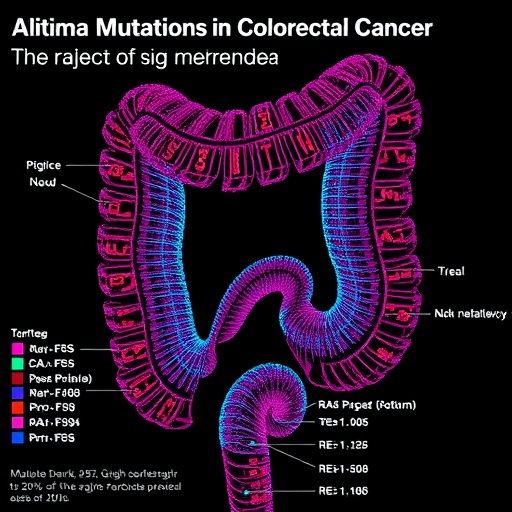In recent groundbreaking research published in the Journal of Translational Medicine, a team of scientists led by Ianniello et al. has revealed intricate details about how tumor mutational burden influences the prognostic outcomes of RAS mutations in metastatic colon cancer. This study aims to provide essential mechanistic insights and explore the correlations between genotypes and phenotypes, shedding light on an area that has long posed challenges to oncologists and researchers alike.
Colon cancer remains a leading cause of cancer-related deaths worldwide, and understanding the molecular underpinnings of this disease is crucial for improving patient outcomes. The role of genetic mutations, particularly in the RAS family of genes, has garnered increasing attention. RAS mutations are prevalent in colorectal cancer and are associated with poor prognosis. However, the complexities of how these mutations interact with other factors, such as the tumor mutational burden, had remained poorly understood until now.
The study meticulously investigates the interplay between overall tumor mutational burden and the impact of RAS mutations on patient survival. Tumor mutational burden refers to the total number of mutations within a tumor’s DNA. Previous evidence has suggested a connection between high mutational burden and improved responses to immune checkpoint inhibitors, highlighting a potentially valuable avenue for therapeutic intervention. However, the authors sought to delve deeper into how this mutational landscape affects the specific prognostic implications of RAS mutations in the context of metastatic colon cancer.
Ianniello and colleagues employed a robust methodological framework, utilizing genomic sequencing data from a cohort of metastatic colon cancer patients. By analyzing the mutational profiles, they were able to stratify patients based on their RAS mutation status and tumor mutational burden. This comprehensive analysis led to the discovery of significant correlations that suggest patients with high mutational burden may not fare worse despite harboring RAS mutations. On the contrary, the presence of a high mutational burden appeared to mitigate the adverse prognostic effects typically associated with RAS mutations.
The team also provided mechanistic insights into how this relationship might operate on a cellular level. The findings indicate that high mutational burdens could potentially enhance immunogenicity, leading to better immune system recognition of tumor cells. This may subsequently bolster the effectiveness of immune responses against tumors harboring RAS mutations, which usually suppress such responses. Thus, the research posits a paradigm shift in understanding RAS mutations and their impact on treatment strategies in metastatic colon cancer.
Furthermore, the study presents genotype-phenotype correlations that highlight the necessity of tailored therapeutic approaches. By recognizing that RAS mutations in the context of a high mutational burden may not confer the same poor prognosis as previously thought, oncologists can reconsider treatment plans. This could pave the way for more nuanced patient stratification in clinical settings, allowing for optimized therapeutic interventions based on an individual’s specific mutational profile.
Within the research, there is also an emphasis on the potential implications for the development of targeted therapies. If future studies corroborate these findings, they may lead to innovative treatment strategies that specifically address the unique challenges posed by RAS mutations in the context of high tumor mutational burden. This could ultimately improve survival outcomes and transform the care landscape for patients facing metastatic colon cancer.
As the authors conclude, additional research is crucial to further delineate the underlying biological mechanisms at play. Investigating the specific roles of various mutations, other than RAS, could also enhance the understanding of tumor evolution and behavior in response to different therapeutic modalities. This study indeed lays the groundwork for such ambitious future endeavors, with the potential to significantly impact the field of oncogenomics and personalized cancer treatment.
The implications of this study are vast and far-reaching. With the rising popularity of tailored therapies and personal medicine, understanding the interaction between genetic mutations and tumor characteristics is more critical than ever. As we strive for improved treatment options in oncology, revelations like those presented by Ianniello et al. serve as beacons of hope in the relentless fight against cancer.
In summary, the research conducted by Ianniello and colleagues offers transformative insights into the relationship between tumor mutational burden and the prognostic significance of RAS mutations in metastatic colon cancer. These findings not only challenge existing paradigms but also pave the way for enhanced therapeutic strategies and personalized medicine approaches that could revolutionize treatment for countless patients worldwide.
The scientific community eagerly awaits further validation of these results and their implications for clinical practice. Additionally, ongoing discussions about how best to integrate genomic profiling into routine oncology care will be crucial moving forward, ensuring that every patient receives the most informed and effective treatment available.
The intersection of advanced genomic research and clinical application underscores the dynamism of contemporary medical science. As we move closer to a more precise understanding of cancer genetics, studies like this are instrumental in shaping the future of oncology, offering new hope to patients facing daunting diagnoses and fostering innovation in treatment development.
In conclusion, this pivotal research shines a light on the evolving landscape of cancer treatment, driven by genetic insights. The dynamic interplay between tumor mutational burden and RAS mutations encourages a reevaluation of traditional prognostic models and suggests a path toward improved outcomes for those battling metastatic colon cancer.
Subject of Research: The impact of tumor mutational burden on the prognostic effect of RAS mutations in metastatic colon cancer.
Article Title: Tumor mutational burden modulates the prognostic effect of RAS mutations in metastatic colon cancer: mechanistic insights and genotype-phenotype correlations.
Article References: Ianniello, M., Ottaiano, A., Bocchetti, M. et al. Tumor mutational burden modulates the prognostic effect of RAS mutations in metastatic colon cancer: mechanistic insights and genotype-phenotype correlations. J Transl Med 23, 1226 (2025). https://doi.org/10.1186/s12967-025-07273-w
Image Credits: AI Generated
DOI: https://doi.org/10.1186/s12967-025-07273-w
Keywords: Tumor mutational burden, RAS mutations, metastatic colon cancer, prognosis, genomics, personalized medicine.




